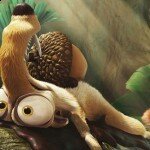In Last Ride, Hugo Weaving won’t be seen dodging bullets in slow motion or transforming into a giant killer robot. Instead, he can be seen as the very flawed, very human ex-con Kev, on the run in the Australian outback with his ten year-old son Chook.
Steering clear of the melodrama that is usually served with the fugitive premise, director Glendyn Ivin ominous debut provides a deep character study of a jaded man not fit to be a father. Whilst the minimalistic plot could have benefited from a few more thrills, Last Ride still delivers on the promise Ivin exemplified in his short film Cracker Bag, which went on to win the Palme d’Or at Cannes in 2003.
Loosely adapted the from Denise Young’s novel The Last Ride, Mac Gudgeon’s screenplay cleverly divulges the story through snippets of dialogue and flashbacks. Petty criminal Kev (Hugo Weaving) and his son Chook (Tom Russell) are on the run, seeking refuge in the unforgiving South Australian outback. Pitted against the elements as well as each other, their troubled relationship is pushed to the limits as Kev’s frighteningly volatile nature sees him take a few too many parenting lessons from his own abusive father. As Chook expresses growing concern for the well-being of a man named Max (John Brumpton), the consequence of Kev’s aggression becomes alarmingly apparent as their past starts to catch up with them.

|
Last Ride is a slow-burning story of love and survival that manages to engage even once the predictably plotted narrative loses steam. This greatly owes to Hugo Weaving’s faultless performance as Kev, whose violent temperament is brilliantly underpinned by a hint of genuine compassion. Showing promise of a bright future is newcomer Tom Russell as Chook, who more than capably plays across from the three time AFI award winning actor. In support, Anita Hegh brief stint as Kev’s former flame Maryanne deserves praise for memorably seeping in on what is otherwise a two man show.
Easily the film’s most illustrious character is the hauntingly beautiful scrubland of the Flinders Ranges. Captured in vivid widescreen by Greig Fraser, Ivin uses the callous environment to echo Kev and Chook’s turbulent relationship and to progressively isolate them from society. Their seclusion is never more apparent than when they travel across the eerie plains of Lake Gairdner, the fourth largest salt lake in Australia, where the limitless horizon perpetually projects the blue sky across the lake’s thin veil of water. It’s all beautifully underpinned by Paul Charlier’s sparse, but affecting sound scape.
Yet the film’s technical achievements can only mask Last Ride‘s narrative deficiencies for so long. As much as there is to appreciate about the convincing character study Glendyn Ivin has crafted, his minimalist approach to filmmaking doesn’t suit the feature format as much as it did in his short form works. Whilst Last Ride will do well at finding an appreciative audience amongst arthouse crowds, there isn’t enough action or suspense driving this character driven story to appease a mainstream audience. That’s hardly a criticism at all really.
Read our interview with director Glendyn Ivin and actor Tom Russell here!
 Follow the author Anders Wotzke on Twitter.
Follow the author Anders Wotzke on Twitter.















